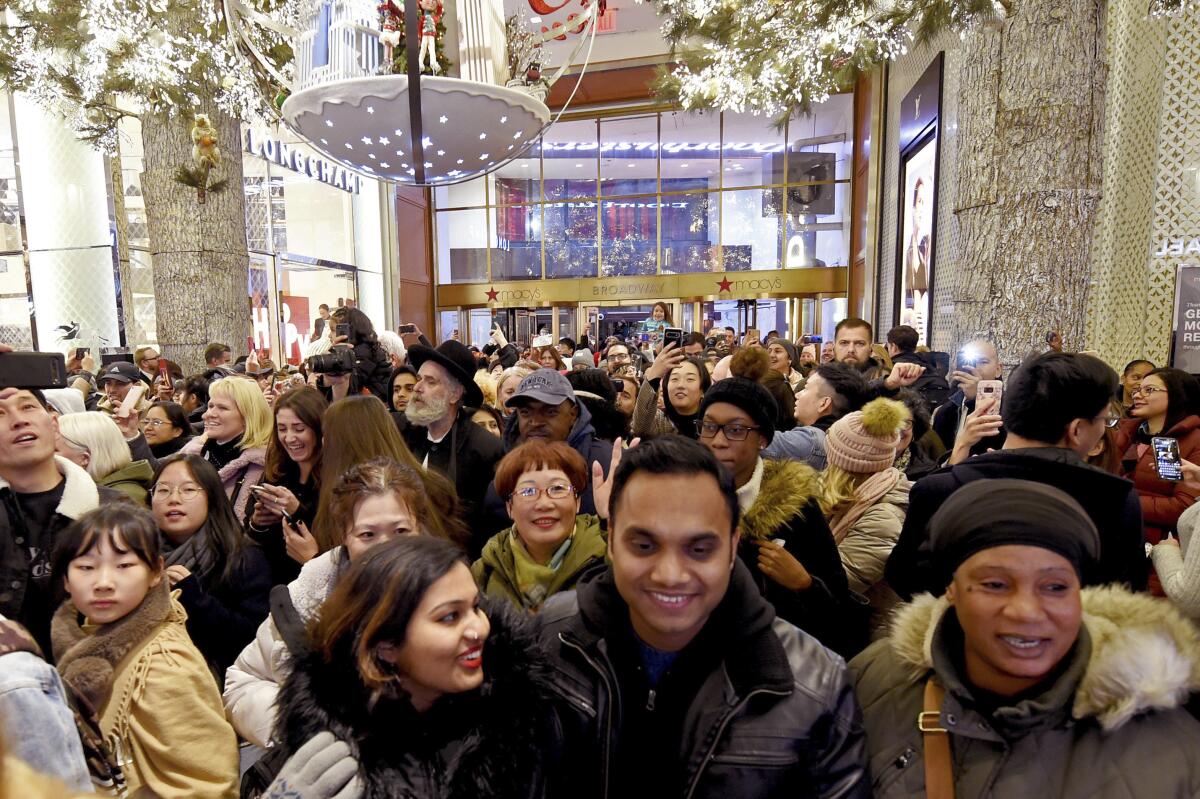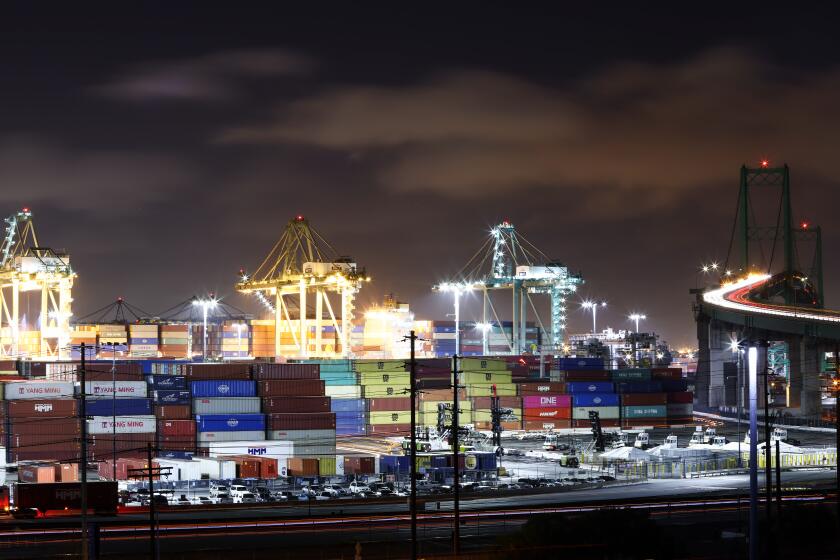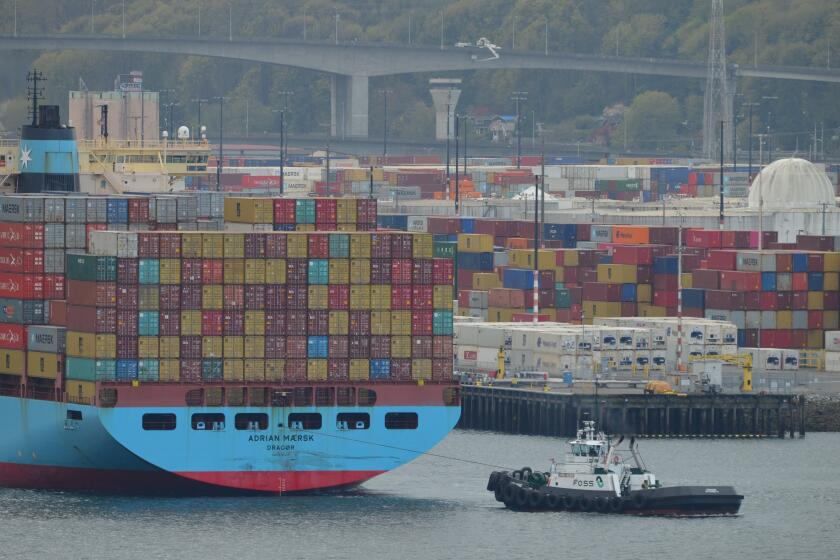There’s only one real solution for supply chain problems: Stop consuming so much

- Share via
The supply chain crisis is the universe’s way of teaching Americans about logistics. Before COVID, most Americans neither knew nor cared about the subtleties of just-in-time management. We remained largely untroubled by the tactics through which every possible efficiency had been exacted along the manufacturing journey of our trinkets, from raw materials to box on our doorstep. With prices rising by 6.2% year over year for October, we’re starting to pay attention to the architecture and management that we once took for granted.
We have learned that in order to wring every possible working moment from warehouse workers, bathroom breaks have been curtailed. Shifts have been stretched from eight to 12 hours. Healthcare plans have lost dental and vision, and premiums are higher. Unionized staff were turned into contractors, hireable and fireable at will. When the pandemic caused aggregate demand to plummet, the great engine of just-in-time logistics idled accordingly. Now, with restrictions lifted and savings ready to spend, the machine has stalled.
The great American supply chain has hit the skids, and a Times reporter took a cross-country trip to check out the economic mayhem.
As demand roared back, just-in-time production didn’t have the capacity to make enough in time. The effects ripple through to large and small purchases. Ongoing semiconductor shortages are partly to blame for why PlayStations won’t be found under the tree this Christmas. The number of new homes being built in the U.S. is constrained by supply chain issues. At America’s ports, backlogs are growing as warehouse space becomes increasingly expensive, drivers are quarantined, and capacity at every stage is limited. The number of ships waiting outside the Port of Los Angeles, a single-digit figure before the crisis, recently hit 100.
Climate change is making things worse. Droughts in Canada and Europe mean that the already high prices for corn and soybeans are being nudged even higher, with knock-on effects reaching your Thanksgiving table.
Increasingly, Americans are also learning about the final step, the most exquisitely crafted and then forgotten cog in the supply chain: us. It’s harder to identify how we ourselves have been schooled by the supply chain, in part because it has been happening for so long.
In the 1930s, U.S. marketing textbooks encouraged manufacturers to embrace styling that would date a product so that a consumer “realizes that many things become decrepit in appearance before the works wear out.” Planned obsolescence is an idea embraced by British porcelain manufacturers in the 1800s, and upon which French fashion houses depended in the 1670s. Although the phrase “door buster” is an idea scarcely 100 years old, loss leaders have been a tool of consumer marketing since the mid-1700s.
There’s a looming deadline next summer for a new contract for dockworkers. If it doesn’t go smoothly, any delays could be terrible timing for the administration.
That long history makes sense, because empires of logistics were once rather straightforwardly just called empires. The British and Dutch East India companies invented the modern supply chain, using gunships and imperial writ to secure territory, labor, raw materials and markets.
As Black Friday and holiday shopping approach, it’s tempting to think we might be able to upend a few centuries of accumulated training and opt out. (I went to a mall on Black Friday when I first came to America and I certainly won’t be going back.) The Church of Stop Shopping and Buy Nothing Day encourage us to void Black Friday by not engaging in transactions. It’s hard to avoid spending, in a culture that has created “holidays” around it: Online retailers have introduced Cyber Monday, and there’s even the convenient (and important) karmic purge of Giving Tuesday. But resisting the rituals requires more than thrift, and a couple days of cold turkey from consumerism doesn’t solve the problem.
Recall what exactly we get when we open the box on the doorstep. Whatever the object, we don’t just purchase the right to use or tend something, to show it off or savor it. As David Graeber and David Wengrow’s “The Dawn of Everything” suggests, the defining feature of modern private property is the right to mistreat and destroy it. In the exercising of this right, capitalism has turned the world into a trash heap. Humans have precipitated the sixth extinction, the burning of the planet and the exploitation of hundreds of millions of workers. All so that we can get that fidget spinner before Christmas for $3.99.
Central to the consumer society, in other words, is an ethic of learned carelessness. The disruption of the supply chain is a long-overdue call to pay attention. Returning “back to normal” would be a tragic missed opportunity.
Consumerism is unfazed by Buy Nothing Day, if afterward we simply resume shopping as usual. But if we draw a deeper lesson from this moment of inflation and shipping delays, there is potential for lasting change. What if consumers come to see the supply chain more fully, not only as the reason we anxiously refresh the UPS delivery page, but as the long cause of social and planetary disruption? That awareness would be the foundation for an ethic of care.
To care is not to abstain from commerce, but to live with a clearer knowledge of how the meeting of our needs depends upon the web of life around us. We depend on one another, and the planet on which we live. Active care can be transformative.
For students of today’s supply chain uprisings, there are instructive lessons. In the history of the supply chain, it was the revolutionary caring for one’s fellow workers — freed and enslaved — that broke a cotton supply chain premised on white supremacy and the tradability of enslaved humans.
Workers in the 21st century are tired of being treated like animals and aren’t ready to join the ranks of the minimum-waged. You can support the wave of strikes across the United States by, as Teen Vogue notes, taking action such as showing up at a picket line or donating to hardship funds.
Direct action, grounded in a care for the Earth from which resources are pulled, is also one of the most effective ways to address the climate change disruptions that will continue to plague the supply chain for the rest of this century. The Indigenous Environmental Network points out that direct action at pipelines, led by Indigenous groups over the last decade, has delayed or halted greenhouse gas pollution equal to one-quarter of annual U.S. and Canadian emissions.
Ojibwe women — water protectors — have been leading a seven-year battle against the Enbridge Inc. tar sands pipeline in Minnesota. Now the president is their ‘only hope’
The opposite of consumer culture is not abstaining from commerce, but appreciating the people and resources behind the things we buy and changing our behavior accordingly. In thinking about the people harmed by consumer choices, and the irreversible effects on the Earth, we can begin to resacralize what the supply chain has cheapened. Our fellow humans’ dignity is sacred. The land and water are sacred. The act of commerce should reflect that, not obscure it.
If we are now buying fewer things, or waiting longer to get them or paying more for them, those are invitations to reimagine the system of work and extraction that renders us complicit in acts of violence and indignity the world over. This “broken” supply chain is an opportunity to realize that the opposite of individual consumption isn’t abstinence. It is to join a collective care revolution.
Raj Patel, a research professor of public affairs at the University of Texas, is a co-author of “A History of the World in Seven Cheap Things: A Guide to Capitalism, Nature, and the Future of the Planet.”
More to Read
A cure for the common opinion
Get thought-provoking perspectives with our weekly newsletter.
You may occasionally receive promotional content from the Los Angeles Times.












